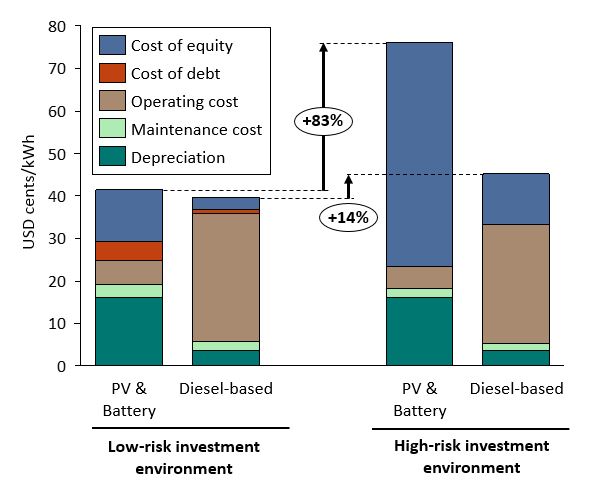Derisking Energy Access
Approximately 1.1 billion people lack access to electricity in developing countries. Innovation and related cost reductions in decentralized energy and storage technologies make off-grid electrification solutions an important approach to addressing the energy access gap. The DERISKING ELECTRICITY ACCESS project by ETH and UNDP analyses how public instruments can make such solutions attractive for private investors.
Electrifying the rural poor represents an investment challenge: it is estimated that annual investments have to reach USD 48 billion in order to achieve the UN goal of external page universal access to clean energy by 2030. The good news is that low-carbon energy technologies for off-grid electrification – particularly photovoltaics and batteries – are becoming cheaper. However, these solutions are characterized by high upfront costs, especially when compared to their fossil fuel-based alternatives. Securing upfront financing is critical, but can be problematic: The investment environment – rural villages in low-income countries – is often very risky. These high risks strongly reduce the private sector’s willingness to invest and/or increase the financing cost, resulting in substantially higher electricity generation costs (see Figure).
In the DERISKING ENERGY ACCESS project, ETH Zurich’s Energy Politics Group (EPG) together with the United Nations Development Programme (UNDP) identify the risks and associated barriers which can hold back private sector investment in electrification. Based on these findings, we propose packages of targeted public interventions to address these risks. Each public intervention acts in one of four ways: reducing, transferring, pooling or compensating for risk. The overall aim is to catalyze private sector investment into electricity access at scale.
The DEA Project builds on UNDP’s external page Derisking Renewable Energy Investment framework and activities, whose original lead report was co-authored by ETH’s Tobias Schmidt.

The ESC member involved in this project is Prof. Tobias Schmidt, head of the Energy Politics Group. The Energy Politics Group focuses on governance questions related to technological change in the energy sector.